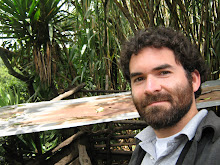*In the spirit of this post, listen to Jorge Drexler's “Mi Guitarra Y Vos”*
“When you reach the heart of life you shall find beauty in all things, even in the eyes that are blind to beauty.”~Kahlil Gibran
“A writer lives, at best, in a state of astonishment. Beneath any feeling he has of the good or evil of the world lies a deeper one of wonder at it all.”~William Sansom
“Oh, I do believe in all the things you see.”
This post is meant to round out a little a previous post about listening called “Be Still and Know.” It ended with a poem by Mary Oliver whose last few lines asked “have you too gone crazy for power, for things?” I share Mary Oliver's appreciation for nature and the ability of nature's beauty to speak to the beauty within us. But I don't feel, nor do I think Oliver does, that the poet's source of awe and inspiration begins and ends with nature. Of course, we can find it in each other, and something of that same awe nurtured by nature can be stirred by the genius of man's industry (I think poetry, or art at all, is a case in point.). Oliver's poem seems, at least to me, a “crying from the wilderness,” calling us back to taking the time to enjoy life and the beauty around us, to not get so caught up in doing that we forget “the better part.” But this joy can also be derived from “listening” to man-made objects, from listening for man's echo in those objects like the ocean's in a seashell. I think that objects become deeply important to us when they become metaphors for what we love and suffer. Here are some quotes from/about one of my favorite poets, Pablo Neruda, whose poetry is equally as rife with nature themes as man-made objects:
“Anyone who hasn't been in the Chilean forest doesn't know this planet. I have come out of that landscape, that mud, that silence, to roam, to go singing through the world.”
~Neruda
“It is useful at certain hours of the day and night to look closely at the world of objects at rest: wheels that have crossed long, dusty spaces with their huge vegetal and mineral burdens, bags of coal from the coal bins, barrels, baskets, handles, and hafts in a carpenter's tool chest. From them flow the contacts of man with earth, like an object lesson for all troubled lyricists. The used surfaces of things, the wear that hands have given to things, the air, tragic at times, pathetic at others, of such things—all lend a curious attractiveness to reality that we should not underestimate.”
~Neruda
“As for his passion for unusual objects, old things . . . he believed that things were charged with the presence of others—that is, an object had been lived with by other people, and something of the life of the other person remained in it, tangibly. Even broken things expressed something we should be in touch with.
Pablo saw these things in a perpetual motion and felt himself to be kind of resting place for them, while they in turn would be changed by his presence.”
~Jose Venturelli
“All his life he collected a great variety of things: ships-in-bottles, shells, French postcards, ship's figureheads, sextants, astrolabes, clocks, stones, books, hats bottles. He was a passionate acquirer. But he was also a great traveler, who always returned to Chile, his roots.”
~Alastair Reid
“I think of him as a creator of ambiances, environments, as much as of words, environments made out of objects. His is a world of materials, materialist, if you like, quite closely connected to his poems. His fantasies are also material. The things that crowd his poems are things you can touch, almost see, almost smell. I think of him as a great creator of of physical surroundings.”
~Jose Donoso
“V, I'm leaving.”
“There are 872 songs on here. I've listened to them all, but I've never danced to any of them.”
“Did you hear me?”
“Yes.”
Subscribe to:
Post Comments (Atom)

I just watched V for Vendetta last night - what a great movie...cool to see you quote it here.
ReplyDeleteAlso I love the Donoso quote about creating material environments with words - beautiful.